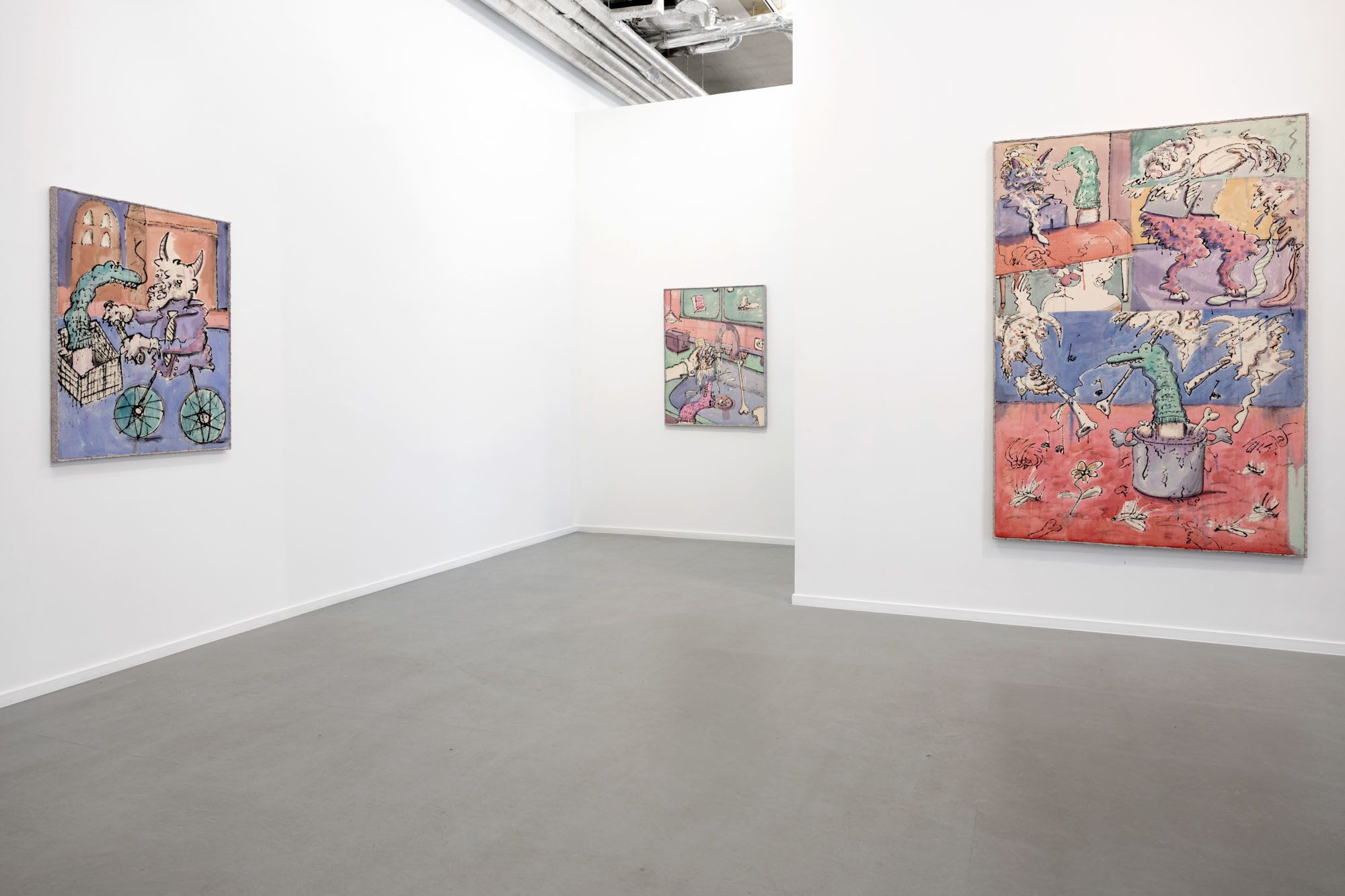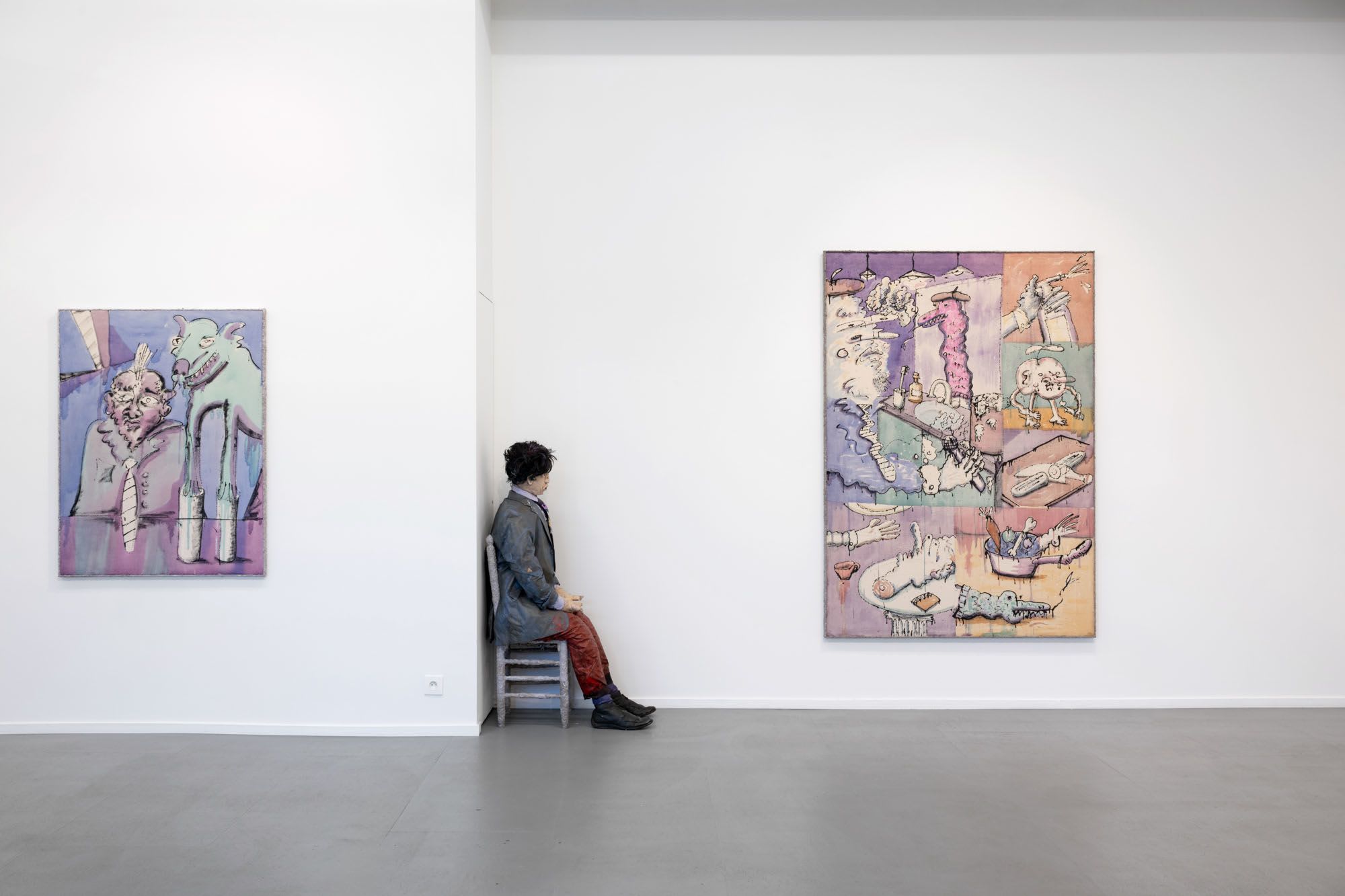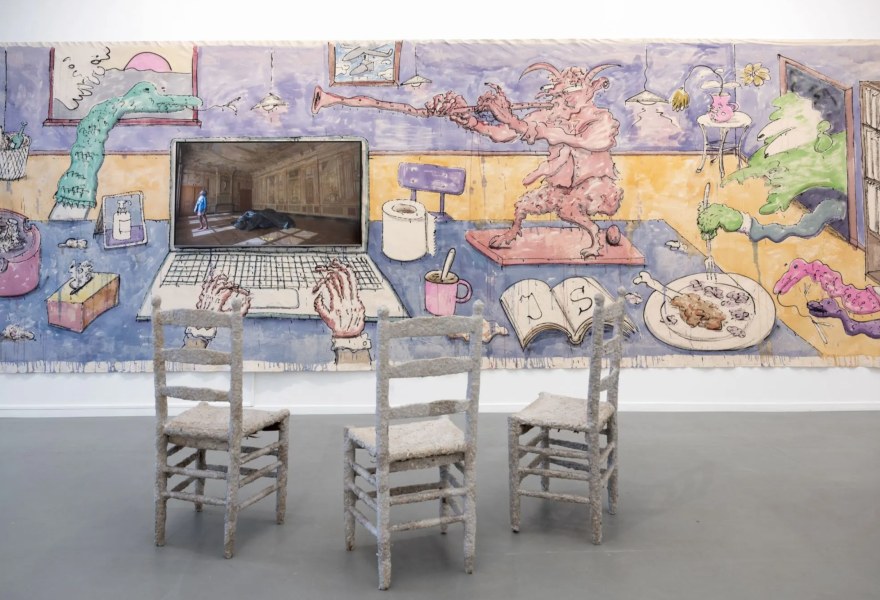28 october 2024, Indra Devriendt
Making choices - William Ludwig Lutgens at PLUS-ONE Gallery
Do we live in a degenerate society? It seems as if we’re all drawn towards flaunting ‘more’ and ‘better’. There’s a danger that performance and stress will take precedence. But thankfully, we largely make our own choices and are responsible for our own well-being.
We see a spectacle of puppets. They’re acting like zombies, creating surreal scenes that are both unsettling and pitiful. Stress, fatigue and/or ignorance can sometimes prevent us from seeing other options. At PLUS-ONE Gallery, we see the first film by William Ludwig Lutgens. “My subjects live in a performance-driven society,” he explains. “These figures are so exhausted that they are no longer able to function, yet they’re unaware of this, so they just keep going. They end up in a zombie-like state, similar to depression or burnout. I consider these the epidemics of our time, fuelled by overstimulation in our society.”
His current exhibition, titled Fantasy Supplement, borrows its name from Slovenian philosopher Slavoj Žižek. “He uses this concept to highlight the use of fantasy as a defence mechanism,” says Lutgens. “We use fantasy to avoid confronting things like trauma. We convince ourselves of things to justify our choices, believing that we must perform and that stress is normal.”

William Ludwig Lutgens, Outside of the symbolic, 2024, PLUS-ONE Gallery
In the film, we hear a strange voice-over. “I used the voice of an old British woman, slowed with AI and layered with effects,” Lutgens explains. “I came up with a number of ideas and the text was written by Cecilia Bien, a researcher and writer from New York. We met earlier this year during my residency in Paris. The texts explain the concept of jouissance, a complex term in Lacanian psychoanalysis that means finding pleasure in pain. It’s uniquely human to inflict suffering on ourselves. We explain jouissance in the film through the concept of the abject, as defined by Julia Kristeva—a word for something that disgusts you.” The visuals are rich, often distracting us from the text. Lutgens filmed at the former Sint-Trudo Abbey in Sint-Truiden. The video Joy Sauce, a playful spin on jouissance, is part of an installation. It’s displayed on a laptop in a drawn room portraying the chaos of daily life. Paper-mâché-covered chairs invite us to observe the scene. Lutgens feels that two-dimensional works have their limits and aims to create more video installations in the future.
Lutgens grew up in a family where work, achievement and earning money were matter of course. “As a teenager, I rebelled against this neoliberal mindset, but it shaped me all the same.” He graduated from HISK in 2017 and in 2018, had his first solo exhibition at PLUS-ONE Gallery, marking a strong start to his artistic career. A busy bee, he has been publishing a newspaper, Het Geïllustreerd Blad, since 2016 and in 2022, founded Red Herring Salon to promote exhibitions and foster artist networks. “I thought I could handle everything. I was getting good at what I did, so I filled my time with more work.” Last year, he ended up with a burnout. His recovery made him realise the need to slow down. He now focuses solely on his art. His recent drawings show a clear evolution in both form and content. “Whereas I used to add as much as possible, I now embrace simplicity.”

William Ludwig Lutgens, 'Fantasy Supplement', PLUS-ONE Gallery
Lutgens primarily showcases paintings, though he’s a draughtsman at heart, with subtle hints pointing to his love for the medium. His canvases are framed with paper-mâché borders and he creates line drawings on transparently primed canvases.
“Someone told me it has a calligraphic feel, which I like. I first spray the black lines, then add shadows with an oil stick, followed by colours in chalk ink. I try to keep the colours consistent, but each piece is always a variation.”
This series of drawings forms a cohesive body of work through recurring techniques, colours, characters and imagery, which invite connections, though there’s no clear storyline. Here, too, we feel the tension between performance and speed, doing nothing and slowing down. Lutgens fills his drawings with a figure wearing a tie, occasionally with hooves or horns, and a sock puppet. “I wanted a hybrid between a performer and a drifter. The tie represents performance, while the goat is inspired by Pan, who to me, feels like an ancient drifter. He wandered the fields, playing the flute and causing mischief. The sock puppet represents self-deception and is inspired by Liegebeest, a 1980s Belgian series with a hand puppet that lies to everyone. We’re driven by performance, but this puppet deceives us, keeping us from seeing reality.”

William Ludwig Lutgens, Only goats lay eggs, 2024, PLUS-ONE Gallery
The half-goat figure with a tie and the sock puppet perform household tasks, work on a laptop or speak into a microphone. “During my residency in Paris, I had no goal and did whatever I felt like, which was often nothing—something that is not acceptable in today’s society. I feel guilty if I postpone work for a day, though I shouldn’t. Sometimes, I spent an entire day doing household tasks, eating and sleeping, but I felt like I hadn’t accomplished anything. The laptop symbolises our constant connectivity. On social media, even making your bed can become a performance to display your productivity. We’re so absorbed in the digital world, but are we aware of its effect on our mental well-being?” The microphones also reference performing, looking good and wanting to be on stage.
What do we spend our time on? What gives us fulfilment and supports our mental well-being? These choices are ours to make. Thankfully, we can make changes when we are no longer able to handle pressure and expectations. One moment, we may want to achieve and reach goals and the next, we may release our inner drifter and enjoy doing nothing.

William Ludwig Lutgens, 'Fantasy Supplement', PLUS-ONE Gallery
